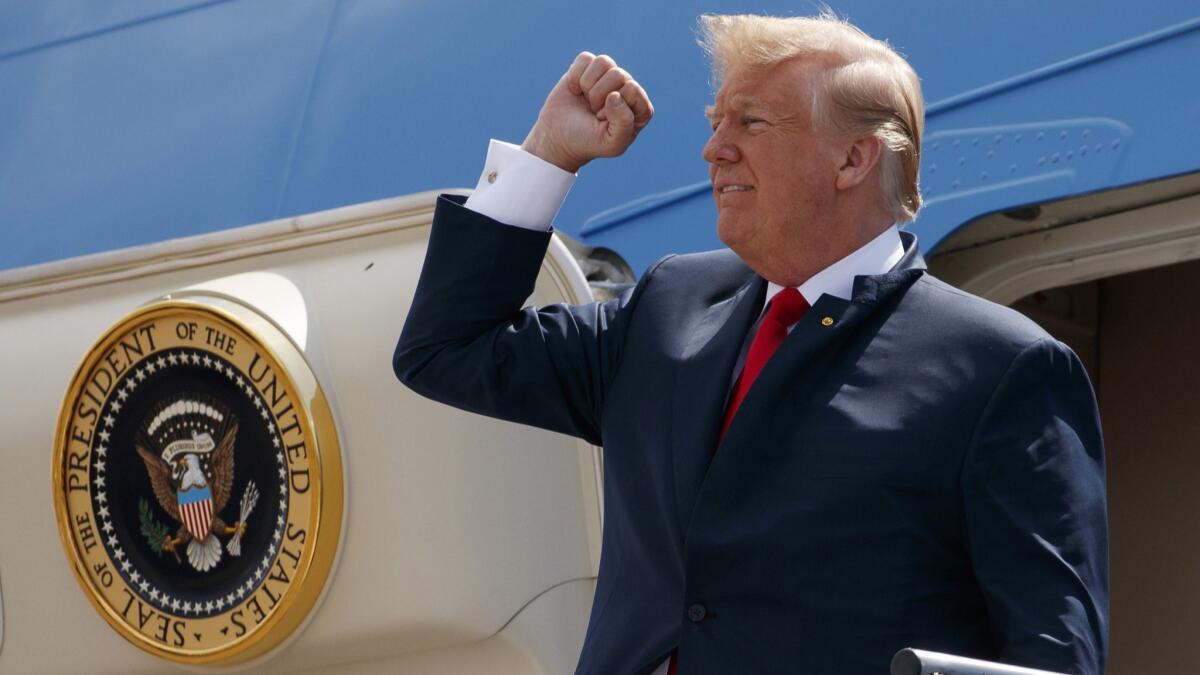Editorial: Trumpâs best weapon against impeachment may be his ability to change the subject

President Trump isnât the most polished speaker to occupy the Oval Office, but heâs peerless when it comes to rhetorical jujitsu.
His handling of the impeachment inquiry launched by House Democrats is just the latest example of Trump trying to turn his faults into strengths, and his criticsâ accusations into a weapon to use against them. Itâs a high-octane version of whataboutism, perpetually shifting the publicâs focus away from Trumpâs own questionable acts onto his opponentsâ (real or imagined) faults.
The House inquiry was triggered by a complaint from a whistleblower that Trump had pressured Ukraineâs new leader to investigate former Vice President Joe Biden and Bidenâs son Hunter, who had a lucrative post on the board of a Ukrainian energy company. Late Thursday night, the House released text messages from U.S. diplomats suggesting that they were instructed to tell Ukrainian officials that Trump would give President Volodymyr Zelensky the military aid and presidential audience he coveted only if the Bidens were investigated.
The Trump administration had initially withheld the whistleblowerâs complaint from lawmakers, only to have it brought to light by the intelligence communityâs inspector general. Trying to strong-arm a foreign ally dependent on U.S. aid to help oneâs reelection campaign, and then concealing a complaint about that act from Congress, reeks of an abuse of power.
True to form, Trump hasnât denied asking Zelensky to investigate the Bidens. Speaking to reporters Thursday, he even put forward the same request to the Chinese government, with whom the United States is locked in difficult trade negotiations to end a damaging trade war.
The message from Trump was that the issue isnât his behavior in office, itâs Joe Bidenâs. The real whistleblower here isnât some unidentified intelligence officer; in Trumpâs mind, itâs Trump. And the ends â exposing supposed corrupt acts by the Bidens â transform the means â using the presidency in a way that serves the interests of one man, Donald J. Trump â from a potentially impeachable offense to an act worthy of commendation.
Punch, meet counterpunch. As Trump put it in a November 2012 tweet, âWhen someone attacks me, I always attack back ... except 100x more. This has nothing to do with a tirade but rather, a way of life!â
What makes Trumpâs style distinctive is his habit of projecting his own flaws and perceived weaknesses onto his critics.
Sometimes it takes a childish, âI know you are, but what am I?â form. One example is from the Oct. 16, 2016, presidential debate, when Hillary Clinton said heâd be a puppet for Russian President Vladimir Putin, and Trump replied, âNo puppet. Youâre the puppet.â
Other times itâs more sophisticated. To try to counter the evidence that Russians meddled in the 2016 campaign on Trumpâs behalf, the president and his minions have pushed the theory that special counsel Robert S. Mueller IIIâs investigation and the FBI counterintelligence probe that preceded it were the fruits of collusion among Democrats, the Clinton campaign and Russian operatives. Alternatively, theyâve argued that Ukrainians allied with the Democrats planted the evidence implicating Russians in the theft of emails from Democratic National Committee servers.
Like any good conspiracy theorist, Trump ties his accusations to nuggets of truth â about the so-called Steele dossier, for instance, or Hunter Biden. But layered upon those nuggets is a heaping helping of fantasy and provably false speculation. The Steele dossier didnât trigger the FBIâs investigation into Russian interference. Murdered Democratic National Committee staffer Seth Rich was not the source who supplied the committeeâs emails to WikiLeaks. The DNCâs server is not being stored in Ukraine by a Ukrainian millionaire. The ouster of a Ukrainian prosecutor sought by Joe Biden (and numerous European leaders) did not cut short a corruption investigation into his sonâs company, a point that an audit by the Ukraineâs new top prosecutor should make clear.
The challenge for the public is to distinguish between legitimate questions and smokescreens â or flat-out lies.
Making sure the FBI followed proper procedures in launching the Russia meddling probe and surveilling some figures involved in the Trump campaign falls into the legitimate category. That subject is being pursued both by the Justice Departmentâs inspector general and U.S. Atty. John Durham in Connecticut, two respected nonpartisan figures, although the independence of Durhamâs probe has been clouded by the intercessions of Trump and his attorney general-turned-apologist, William Barr.
On the other hand, Trumpâs suggestion that the president is obliged to lean on allies to get them to investigate bogus claims of corruption by one of his top political rivals is a blatantly false smokescreen thrown up to hide an apparent abuse of power. So is arguing that thereâs nothing amiss about him asking a âfavorâ of an ally desperately in need of the military aid that Trump had just put on hold.
This is deception masquerading as virtue. Voters should not let themselves be thrown by it.
More to Read
A cure for the common opinion
Get thought-provoking perspectives with our weekly newsletter.
You may occasionally receive promotional content from the Los Angeles Times.









